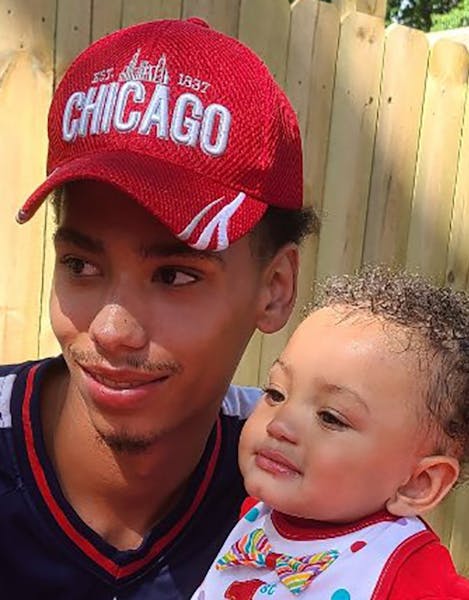A major development was quietly dropped in the middle of jury selection last week on the first day of trial for former Brooklyn Center police officer Kimberly Potter: She will take the witness stand to explain why she fatally shot Daunte Wright during a traffic stop earlier this year.
The understated announcement by defense attorney Paul Engh didn't shock many veteran attorneys keeping tabs on the case, but its timing came earlier than expected. Lawyers not involved in the case said it illustrates the defense's confidence in Potter's ability to win over jurors, and will shore up the defense's claim that she made an "innocent mistake" by firing her handgun when she meant to deploy her Taser.
"It was brilliant," Joseph Daly, Mitchell Hamline School of Law emeritus professor, said of Engh's delivery. "Usually you don't make the decision whether the defendant will take the stand until you've heard the entire case-in-chief of the prosecution."
Engh was questioning a woman in her 60s last Tuesday who said she had a "very negative" impression of Potter. He asked if she could keep an open mind, telling her with little fanfare that Potter would testify at trial. "Wait for her," implored Engh, who casually shared the information with other prospective jurors as jury selection continued.
"There's some research that says jurors make up their minds quickly," said defense attorney Marsh Halberg. "You're trying as a defense lawyer to hold an open mind until they get to my part of the case, and by announcing that Potter's testifying, you've helped give them a hook."
Potter, 49, is charged in Hennepin County District Court with one count each of first- and second-degree manslaughter for shooting Wright on April 11. Police stopped Wright, 20, for expired tabs and discovered there was a warrant for his arrest on a gross misdemeanor weapons charge.
Police body camera video showed Wright breaking free of an officer trying to arrest him and getting back into his car, prompting Potter to fire a single shot while yelling, "Taser! Taser! Taser!"
Potter's defense plans to call psychologist Laurence Miller to testify about "slip and capture errors," where a dominant behavior inadvertently replaces a less-dominant one. Prosecutors have argued that Potter acted negligently and should have known better based on her training.
A jury of 14, including two alternates, was seated by Friday morning. Opening statements are scheduled to begin Wednesday, with the trial projected to wrap up in the last week of December.
While it's not unheard of to announce a defendant's decision to testify this early, such a move isn't usually revealed until opening statements and often not until after the prosecution has called all of its witnesses and the defense begins its case.
Three of the four other officers tried in Minnesota for killing someone on the job — Derek Chauvin, Mohamed Noor and Jeronimo Yanez — didn't reveal whether they would take the stand until after the prosecution's case. Chauvin did not testify; Noor and Yanez did. Washington County Sheriff's Deputy Brian Krook, who was also represented by Engh, started his trial last year with full disclosure he would testify.
It's more common for defense attorneys to ask prospective jurors if they understand that defendants have a constitutional right to remain silent, and whether they will think less of defendants who choose not to testify.
"I've seen the reverse more often when the possibility of not testifying is explored in jury selection," said former Ramsey County Attorney Susan Gaertner, who now works as a defense lawyer. "Obviously a defendant doesn't have to testify ... but jurors are human and it's hard to imagine that they aren't even subconsciously thinking, 'What's the defendant afraid of? Why don't they want to testify under oath and look us in the eye?' "
There are risks in promising a defendant's testimony while in the middle of picking jurors — the make-up of the jury could change, the presiding judge could issue a ruling affecting the defense or the prosecution's case could introduce surprises the defense wasn't expecting.
"It's a big risk to put a defendant on the stand," Daly said.
Defense attorneys said they consider several factors before deciding whether their client should testify: their criminal history, their ability to react well and quickly to aggressive cross-examination from prosecutors and most important of all, whether they are believable and likeable. The decision ultimately lies with the client.
"Most of the time you don't put your client on [the witness stand] in a criminal case," said defense attorney Joe Friedberg. "These two lawyers, by the way they've been acting in this case — and this is a big thing that he's told the jury she's going to testify — they have a lot of confidence in her and her innocence."
Potter is also represented by Earl Gray, who was part of the team that earned an acquittal for Yanez in the 2016 fatal shooting of Philando Castile.
Potter's testimony could serve a number or purposes for the defense, attorneys said. It could humanize her, particularly if she expresses remorse and cries on the witness stand, it could corroborate the body camera video and it could bookend Miller's testimony.
Hennepin County District Judge Regina Chu has ruled that Miller can testify about the psychological phenomenon of "slip and capture errors" but cannot say whether Potter, who was training a new officer at the time, was suffering from it when she shot Wright.
"She has to explain how her emotions and the adrenaline flowing at that moment could have led her, a ... senior officer who's a trainer, to make that mistake," Daly said. "They'll even have her use some of the same words the expert's going to use."
The fact that Potter has no discipline in her 26-year career and only a verbal reprimand from 2007 for writing about squirrels while on an anti-robbery detail boosts her ability to withstand cross-examination, attorneys said. Another key factor that weighs in her favor, they said, is the body camera video.
While only a short clip of the video has been publicly released, court documents said that in the aftermath Potter sobbed and said, "Oh my God," at least 59 times and stated that she mistook her gun for her taser. A longer version of the video and additional body camera videos will likely be played at trial.
"There's nobody in the world that could make up a falsehood that quickly," Friedberg said.
Potter's defense has also argued in court filings that Wright's attempt to flee threatened the safety of one of Potter's colleagues at the scene.
"Sgt. Johnson was inside the passenger compartment when Mr. Wright decided to drive away," the defense wrote. "Had not Officer Potter intervened, Sgt. Johnson might have well been dragged to his death."
"That's a big deal," Friedberg said of the defense claim, adding that police have the legal authority to kill under such circumstances.
While on first blush Potter's clean record may make her seem like an ideal witness, other issues could open her up to attack from prosecutors.
"There are other things that have happened in the past that can be important or powerful in a cross-examination," Gaertner said. "Certainly in any case of this nature, training or the lack thereof is going to be a focus of cross-examination and direct examination."
Prosecutors noted in the criminal complaint against Potter that she received Taser training on Nov. 5, 2020, and March 2, just a little over a month before the shooting. They said Potter was explicitly warned by the manufacturer that, "Confusing a handgun with a CEW [Taser] could result in death or serious injury. Learn the differences in the physical feel and holstering characteristics between your CEW and your handgun to help avoid confusion." Assistant Minnesota Attorney General Matthew Frank told the very same juror on the first day of trial that she would hear about Potter's training.
One of the biggest risks in putting a defendant on the stand, Daly said, is that it gives the prosecution one more chance to present its case through cross-examination. The prosecution first lays out its case in opening statements and then a second time when it calls its witnesses, he said.
"If you put the defendant on the stand, you basically put [the prosecution] case on again through the defendant," Daly said. "They'll walk her through each and every training session she had with respect to the Taser and they will even read to her the warnings the manufacturer put out and ask her, 'Did you read this?' "

Want to share info with the Star Tribune? How to do it securely

A Minnesota field guide to snow shovels: Which one's best?
Sign up for Star Tribune newsletters

